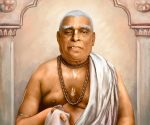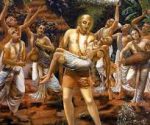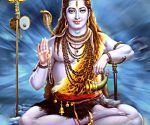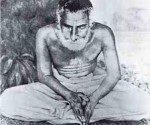Sri Gadadhara Pandita’s Disappearance & Srila Bhaktivinoda Thakura’s Disappearance Day
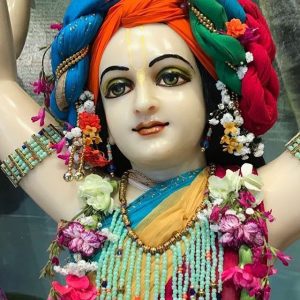 Sri Srimad Bhaktivedanta Narayana Gosvami Maharaja – July 10, 2002 in Birmingham, England
Sri Srimad Bhaktivedanta Narayana Gosvami Maharaja – July 10, 2002 in Birmingham, England
Today is a very auspicious day. In all our mathas we are engaged in arranging for the Ratha-yatra festival for Jagannatha, Baladeva, and Subhadra; but prior to that we celebrate the divine disappearance day of Srila Bhaktivinoda Thakura and Srila Gadadhara Pandita.
Srila Bhaktivinoda Thakura and Gadadhara Pandita are in the same line. We can say, and it is also stated in sastra, that Srila Bhaktivinoda Thakura is a manifestation of Srila Gadadhara Pandita. Srila Bhaktivinoda Thakura was always in a mood of service to Srila Gadadhara Pandita. He is Kamala Manjari, serving the Divine Couple Sri Sri Radha-Krsna under the guidance of her beautiful friend Rupa Manjari, with a special inclination towards Srimati Radhika.
For us, this means some exceptionally good fortune. We are very fortunate, because only little time has passed since he disappeared. When I joined the Gaudiya Vedanta Samiti, Caitanya Mahaprabhu’s Mission, I could have even met and served his son and real disciple, Srila Bhaktisiddhanta Sarasvati Gosvami Thakura, for some little while. At that time I was old enough to have had his darsana and served him, but unfortunately – even though I was very near, I was not able to meet and associate with him.
But still I’m very fortunate, because his direct disciple, his very bold disciple, the life and soul of Srila Bhaktisiddhanta Sarasvati Thakura, my Guru Maharaja, took me by my sikha and engaged me in his service.
Once I had a discussion with disciples of Srila Bhaktisiddhanta Sarasvati Prabhupada. When they spoke some siddhanta that was not proper, I could not appreciate it and I told them, “I have seen Srila Prabhupada; you have not seen him. I saw him through my ears, and you saw him only through your eyes. My vision is perfect.”
Then they complained to my Guru Maharaja, saying, “He is very proud. He is challenging us that we did not see Srila Prabhupada but he has seen him!” My Guru Maharaja politely answered, “He is right. He actually saw him, by hearing from me, and you saw him only by your eyes. The eye can cheat, but the ear cannot cheat.”
I am very lucky that my Guru Maharaja was pleased with me, and kept me with him and engaged me in his service; and still I can serve him. He even wrote something about me in his preface to Jaiva Dharma, and therefore I feel very fortunate.
If we follow the instructions of Srila Bhaktivinoda Thakura and Srila Gadadhara Pandita, especially Sri Sri Gaura-Gadadhara, we can develop our Krsna-consciousness. We should read and hear their teachings deeply, so that we may become inspired to follow them.
[Prema-prayojana dasa tells about the life and character of Sri Gadadhara Pandita.]
Srila Gurudeva: Why did Caitanya Mahaprabhu forbid Gadadhara Pandita to leave Jagannatha Puri? Why did He ‘cruelly’ order him to stay there, while He went to Vrndavana without him? What was His real, internal mood? The answer is that if Gadadhara Pandita would remain with Him, then His mood of being Krsna would arise. When they would go together to Govardhana, to Vrndavana, Rasa-sthali and other places, then Gadadhara Pandita would say something like:
barhapidam nata-vara-vapuh karnayoh karnikaram
bibhrad vasah kanaka-kapisam vaijayantim ca malam
randhran venor adhara-sudhayapurayan gopa-vrndair
vrndaranyam sva-pada ramanam pravisad gita-kirtih
(Srimad-Bhagavatam, 10.21.5)
[“I worship that Parabrahma, whose crown is decorated with a peacock feather, whose large forehead is marked with tilaka of musk, whose shark-shaped earrings swing around His neck, whose eyes resemble lotus flowers, whose neck has three lines like a conchshell, whose lotus face is graced with a gentle smile, who holds a flute to His bimba fruit-like lips, whose bodily complexion is like that of a fresh monsoon cloud, who is supremely peaceful, who stands in a delightful three-fold bending posture, whose yellow cloth is resplendent like the rays of the sun, who is adorned with a victory flower garland, who is surrounded on all sides by hundreds of gopis, and who resides in Sri Dhama-Vrndavana in the guise of a cowherd-boy.”]
By hearing this, Mahaprabhu would not have been able to control Himself. His krsnatva (His being in His identity as Krsna) would have become visible to all, and His pastime of giving raganuga-bhakti and tasting Radha’s mood would have been finished.
[Prema-prayojana dasa tells the pastime of Gadadhara Pandita and Pundarika Vidyanidhi.]
Srila Gurudeva: There is an important teaching here. When Gadadhara Pandita first went to meet Pundarika with Mukunda, he misunderstood him. It was only by the mercy of Mukunda that Gadadhara was able to see Pundarika Vidyanidhi’s true ecstatic moods. The teaching in this pastime is that if you want to know who is a Vaisnava, you cannot understand him by your sense perception. You cannot recognize a Vaisnava by yourself. You will have to go to him under the guidance of a Vaisnava; then you can understand.
Sri Gadadhara Pandita is Srimati Radhika Herself; he cannot commit any mistake. Only to teach us that we have to take shelter of a high-class, bona fide guru, he played a role and performed this pastime. Only through this process we can achieve pure bhakti: You may be intelligent or an important person, but without a guru you cannot serve Sri Sri Radha-Krsna. Your bhakti cannot develop.
[Gadadhara Pandita and Mukunda were very dear friends and always kept each other’s company. Mukunda thus told Gadadhara Pandita, “Listen carefully Gadadhara, a very great devotee has come to Navadvipa. You have been hankering for the association of pure Vaisnavas and today your desire will be fulfilled. I will take you to see a wonderful Vaisnava devotee. In return for this, I simply want you to think of me as your dear servant.”
The excited and happy Gadadhara Pandita called out the name of Krsna as they proceeded towards the great Vaisnava’s residence with Mukunda. Arriving there, they found Pundarika Vidyanidhi sitting comfortably. Gadadhara offered his obeisances and was respectfully seated.
Vidyanidhi inquired from Mukunda, “What is his name and from which village does he come? I can see that his body is effulgent due to rendering devotional service to the Supreme Lord Visnu, both his form and demeanour are extremely wonderful.”
“His name is Sri Gadadhara,” Mukunda replied. “He is very fortunate because from early childhood, he has been totally detached from family life. In his external material identity, he is the son of the brahmana Sri Madhva Misra. Since he is absorbed in devotional service, he only associates with Vaisnavas, and he is extremely dear to all the devotees. When he heard about you, he was anxious to meet you.”
After hearing the wonderful qualities of Gadadhara Pandita, Vidyanidhi was very pleased to meet him. The great personality, Sri Pundarika Vidyanidhi, sat like a prince. His beautiful bed was made of wood, covered with intricate brass and reddish stone inlay work. Above it were three tiers of ornamental drapes made of glittering brocade cloth. He was seated on a soft mattress covered with clean expensive sheets, and silk pillows were placed under his back.
On either side of him, many small and large water pots sat within his reach, as well as a nice shining brass plate with neatly prepared betel pan upon it. Two large ornate mirrors hung on either side of him into which he continually glanced while smiling with lips reddened from chewing pan. He wore a sandalwood paste tilaka mark upon his forehead and his face was decorated with dots made from a mixture of sandalwood and perfume. As for his hair, it was well-groomed and shining with delicately perfumed hair oil.
Two persons stood behind him fanning him gently with long peacock feathers and in front of him was a nicely prepared hammock. As he followed a life of pure devotional service, he looked as charming as Cupid himself. Those who did not know him would consider him a prince, as everything about him and around him gave the impression that he was a man of the easy and comfortable life, given to pleasure.
When Gadadhara Pandita saw these luxurious items and a general atmosphere of materialistic life, he became suspicious. Since Gadadhara was a fully renounced soul from his early childhood, naturally some doubts regarding the character of Pundarika Vidyanidhi entered his heart. He thought, “What sort of a Vaisnava is he, surrounded by so much finery and lavish living? Hearing about his devotional mood, I developed great respect for this person, but now upon seeing him, it is slowly giving way to doubt and suspicion.”
Mukunda understood the mind and heart of Gadadhara Pandita, thus he took it upon himself to reveal the true nature of Pundarika Vidyanidhi. By the special mercy of Lord Krsna, Gadadhara Pandita would be allowed to perceive everything; nothing would remain unknown to him.
In a very sweet voice, Mukunda began to sing a verse from the Srimad Bhagavatam describing the glories of devotional service, “Alas, how shall I take shelter of one more merciful than He who granted the position of mother to the she-demon, Putana? Putana was unfaithful and always hankering for the blood of human children. With that desire in mind, she prepared deadly poison to be sucked from her breast and came to kill Krsna, but because she offered her breasts to the Lord, she attained the greatest achievement.”
As soon as these words concerning devotional service entered his ears, Pundarika Vidyanidhi began to weep, tears of ecstatic love welled up in his eyes, rolling down his face profusely like streams of the Ganga. Simultaneously, all the symptoms of ecstasy manifested on his person. He wept, trembled, rolled, horripilated, roared and finally fell into an unconscious state of ecstasy.
Then suddenly regaining consciousness, he said in a loud voice, “Speak! Speak!” and again fell down to the ground. Agitated with spiritual emotions, he kicked everything that was near him and all the luxurious paraphernalia went crashing to the ground. The shining brass pots of water, the container of betel pan, pillows, bed sheets, everything became a confused jumble. He began tearing his fine clothes, and his well-groomed hair went haywire as he wept and rolled in the dust.
He cried out, “O Krsna, My Lord, My soul, My very life, You have made me hard-hearted like a stone!” He lamented loudly, piteously crying out, “I have been deprived of the Lord’s association in His most merciful incarnation!” He rolled around and crashed down to the ground. Everyone was afraid he might break his bones.
He trembled so violently that three persons could not hold him down. He kicked everything that was in his way, as his disciples stood by helplessly, unable to control him. In this way, the storm of ecstatic love continued until it finally abated and he fell into an unconscious state of bliss. He lay down without breathing, totally submerged in an ocean of spiritual ecstasy.
Amazed at what he had witnessed, Gadadhara Pandita began to worry, thinking, “What inauspiciousness has overcome me to make me think in such an offensive manner about this great personality?” He embraced Mukunda, being extremely pleased with him. Drenching him with tears of love, he said, “Mukunda you have acted like a true friend, you have shown me a pure and unalloyed devotee of the Lord. It would be difficult to find another pure Vaisnava like him anywhere in this entire creation.
“One can become totally purified simply by observing his devotional attitude. Today, because you are right next to me, I have been able to avoid a great catastrophe. When I saw all the luxurious paraphernalia surrounding Pundarika Vidyanidhi, I was convinced that he was a materialistic Vaisnava given to the pleasures of life.
“You could read my mind and being a greatly magnanimous soul you have revealed to me the unlimited extent of Pundarika Vidyanidhi’s love of Krsna. Yet, today, I have been offensive and the extent of my offence can only be mitigated by your mercy. You must be merciful to me and purify my heart.
“All the devotees who have surrendered to the Lord by the process of devotional service have accepted the shelter and instructions of a guide. Yet, I do not have such an instructor, so I have decided to take shelter of Pundarika Vidyanidhi and follow devotional service under his guidance. I shall counteract all my offences to him by becoming his disciple.”
Thus, Gadadhara Pandita revealed to Mukunda his desire to become a disciple of Pundarika Vidyanidhi. Mukunda was extremely pleased with the decision and patted him on the back saying, “Very good, very good.” (Sri Caitanya-bhagavat, Madhya-lila ch.6]
Seeing Gadadhara Pandita’s doubt, Mukanda Datta recited one verse to Pundarika Vidyanidhi:
aho baki yam stana-kala-kutam
jighamsayapayayad apy asadhvi
lebhe gatim dhatry-ucitam tato ’nyam
kam va dayalum saranam vrajema
(Srimad-Bhagavatam, 3.2.23)
[“How astonishing! When Putana, wicked sister of Bakasura, tried to kill child Krsna by offering Him deadly poison on her breast, He bestowed upon her the position of His nursemaid. Could I ever have as merciful a shelter as that of Lord Krsna?”]
Upon hearing this, Pundarika Vidyanidhi became overwhelmed with ecstatic emotions.
[Prema-prayojana Prabhu tells the story of Vallabhacarya, who visited Mahaprabhu, trying to prove his scholarship.]
A question comes: Krsna dasa Kaviraja Gosvami has stated that Svarupa Damodara, Raya Ramananda and Sikhi Mahiti are Mahaprabhu’s antaranga, most confidential associates. He even spoke about Madhavi devi as being His half intimate associate, but why did he not mention Gadadhara Pandita?
The answer is that Sri Gadadhara Pandita, as Srimati Radhika, is non-different from, or in other words, is in Sri Caitanya Mahaprabhu. Caitanya Mahaprabhu is always in the mood of Srimati Radhika – sometimes in mood of another sakhi, but always in the mood of Srimati Radhika – and always crying. When Sri Caitanya Mahaprabhu is in the mood of Srimati Radhika, Gadadhara Pandita has no function there like others who are antaranga. He is Radhika. Radhika is not different from Krsna, She is not an antaranga.
We can learn so many things in these pastimes. Without a guru one may be powerful like Brahma or Sankara, but one cannot even become liberated, what to speak of serving Radha-Krsna. Caitanya Mahaprabhu personally took initiation from Isvara Puripada, and He inspired Gadadhara Pandita to also take initiation. Initiation is very important.
Some people think that they don’t need a guru. They think that the mantras are written in books, so to read and repeat them is sufficient. But this is absurd. I have seen many sannyasis and other senior male and female devotees who do not even chant their mantras given by their bona fide Guru Maharaja Srila Bhaktivedanta Svami Prabhupada. They do not meditate on them. So how can one who does not even have a guru become inspired? From where will he get strength?
To except a guru is essential. An initiated devotee will think: “I must carry out the order given by my Gurudeva.” We must accept any high class rasika Vaisnava guru. Some may think: “We came in this line because of Bhaktivedanta Svami Prabhupada. We are reading Svami Prabhupada’s books and are following him. There is no need of any other guru.” Even some whose gurus fell down think in this way: “I believe that Srila Prabhupada is my guru, no need to take initiation from anyone else.”
But this will not do. One has to take proper initiation and follow his guru, as did Lord Ramacandra Himself, Caitanya Mahaprabhu, and Nityananda Prabhu, who is akhanda-guru-tattva, the original guru Himself. Nityananda Prabhu personally took initiation from Laksmipati Tirtha, and after that He accepted as His siksa-guru Madhavendra Puripada, whose status was even higher than that of Laksmipati Tirtha. Even Sri Krsna, along with Balaramji, took initiation. They were disciples of Bhaguri Muni. Do not think they took initiation from Sandipani Muni. Sandipani Muni was a school teacher who taught Krsna and Balarama the sixty-four arts, but Their real diksa-guru was Bhaguri Muni.
Krsna personally spoke this to the gopis. The gopis were telling Him: “You do not have a guru, so You are a bogus person.” Krsna replied: “Why are you saying so? You can go and ask Durvasa Muni. It was in front of him that My father Nanda Baba had Me take initiation from Bhaguri Muni. Bhaguri Muni came to my house and I took initiation from him.”
As Nityananda Prabhu gave even more respect to Madhavendra Puripada, his siksa-guru, if the siksa-guru is more qualified and rasika, we should honor him and give him respect. Giving respect to our diksa-guru, we should serve such a siksa-guru even more. There are thousands upon thousands of such examples in our Vaisnava scriptures. Don’t be weak. If you are developing your Krsna-consciousness, your life will be successful, otherwise not. And, someone who is inspiring me in my Krsna-consciousness, especially one who helps me to become a rasika Vaisnava, he is more superior than anyone else. He is really guru. We do not consider Kesava Bharati to be the guru of Sri Caitanya Mahaprabhu, although he was a Vaisnava in the line of Isvara Puripada. Rather, we consider him to be the vesa-guru of Mahaprabhu (who gave Him saffron cloth).
It is very hard to recognize a Vaisnava. We see that even a devotee like Gadadhara Pandita (in his human-like pastimes) could not recognize a pure Vaisnava. He rejected Pundarika Vidyanidhi, because Pundarika Vidyanidhi was chewing betel-nut and living in luxury like a king. If the internal mood of a Vaisnava is high, then such a Vaisnava is to be accepted as highly advanced. A devotee may have a five-, six-, or eight-kilo japa-mala, very long, big tilaka, and thick kanti-mala, and he will start to chant “Hare Krsna, Hare Krsna” as soon as he sees someone. But that person may not be a pure Vaisnava. And another devotee, who is not chanting on a japa-mala, like Pundarika Vidyanidhi, may put us in a dilemma regarding whether or not he is a devotee.
Therefore Mahaprabhu is advising: Do not try to understand who is a Vaisnava by his external appearance. Only an uttama-adhikari can recognize an uttama-adhikari. Even a madhyama-adhikari may be confused. Therefore, do not criticize any Vaisnava or judge him according to his external appearance.
Your life should be successful. If you can develop your Krsna-consciousness, then your life is successful. You may possess great wealth, position, power, beauty, and so many good qualities, but if this one quality, Krsna-consciousness, is not there, your life cannot be successful. Endeavor only to develop your Krsna-consciousness. If the whole world is against you, or if you don’t become wealthy or acquire any position, there is no harm in that. Try to maintain your life only for the purpose of developing Krsna-consciousness; this is the teaching of Srila Rupa and Raghunatha and our guru-parampara. Don’t try to buy bhakti by wealth and money. Only by pure hearted internal service to Sri Guru you can purchase it. Always remember what Krsna promised in Bhagavad-gita:
ananyas cintayanto mam
ye janah paryupasate
tesam nityabhiyuktanam
yoga-ksemam vahamy aham
Bhagavad-gita 9.22
[“But those who always worship Me with exclusive devotion, meditating on My transcendental form – to them I carry what they lack, and I preserve what they have.”]
Those who continuously chant and remember Krsna have no time to maintain themselves and their family; therefore Krsna will come to maintain them. He has promised this. Why fear? If we have strong faith in His words, certainly He is bound to fulfill His promise. But we are very unfortunate; we don’t have such strong faith; this is the problem. Try to overcome this and maintain strong faith, total faith, in Krsna. He is bound to fulfill His promise. All others may fail to keep their promises, but He cannot fail. He cannot.
Try to realize this, and be always conscientious to become a high-class devotee. Give your life only for developing bhakti – bhakti, bhakti, bhakti.
harer nama harer nama harer namaiva kevalam
kalau nasty eva nasty eva nasty eva gatir anyatha
Brhan-naradiya-purana 38.126
[“In this age of quarrel and hypocrisy the only means of deliverance is chanting the holy name of the Lord. There is no other way, no other way, no other way.”]
Harer bhakti harer bhakti harer bhakti eva kevalam – There is no other way; only bhakti, only bhakti, only bhakti.
[Srila Gurudeva leads the devotees in first singing Radhika-astakam and then the kirtana of “Jaya Gaura-Gadadhara.”]
Jaya jaya Gaura-Gadadhara ki jaya! Gadai-Gaurangaji ki jaya! Gaura-premanande hari hari bol!
Now we should discuss about the incarnation of Gadadhara Pandita, Srila Bhaktivinoda Thakura. But don’t hear in such a way that my words will go in one ear and out the other. Hear with both ears, and take what you hear into your heart.
[Syamarani dasi speaks about the presence of many sahajiya sects during the time of Srila Bhaktivinoda Thakura’s preaching]
Srila Gurudeva: We find so many ‘Lalita-sakhis’ in Navadvipa. Male persons put on Indian style saris and nose rings, and say, “We are gopis”. At the same time, they engage in nonsense, illicit activities. Even among us, I know many ladies and gentlemen who can’t even chant five or six rounds, but are very interested to taste goopi-bhava – they want it immediately. For this so-called attainment they can even give up their high-class Guru Maharaja Srila Bhaktivedanta Svami Prabhupada, and instead they go to any babaji, pay two rupies, and get goopi-bhava very cheaply. Such so-called gurus tell them, “You are Lalita, you are Vishaka, and you are Citra, Rupa Manjari etc.” Bogus.
Everywhere, in France and also here (in England), I see these bogus gurus, those who cheat devotees. I request all devotees to be careful. First follow Srila Bhaktivinoda Thakura and read Jaiva Dharma. Chant continuously and follow the instruction given by Srila Rupa Gosvami in his Nectar of Instruction (Upadesamrta):
vaco vegam manasa krodha vegam…
atyaharah prayasas ca…
utsahan niscayad dhairyat…
Also, give proper honor to proper Vaisnavas. This is more important. If you have no interest to chant the holy names and listen to hari-katha, then listen more, again and again. Come to the point of tan-nama-rupa-caritadi sukirtananu (pure chanting of the holy names). Then, when renunciation will appear in your heart and all material desires will disappear, automatically your siddha-deha, your perfected spiritual body, will appear. At that time you will be able to remember asta-kaliya-lila. This is the process of suddha-bhakti, or pure bhakti, as Srila Bhaktivinoda Thakura has clearly told; there is no other path. Don’t worry for your siddha-deha. Don’t try to prematurely think, “I’m the dasi of Rupa Manjari” and so on. First practice very steadfastly and determinedly.
Remember this sloka from Srimad-Bhagavatam (1.2.7):
vasudeve bhagavati bhakti-yogah prayojitah
janayaty asu vairagyam jnanam ca yad ahaitukam
[“By rendering devotional service unto Bhagavan Sri Krsna, one immediately acquires causeless knowledge and detachment from the world.”]
Ahaitukam (causeless knowledge) will come. Wait for that, otherwise you will be like an unripe jackfruit.
[Pundarika dasa explains how sometimes a jackfruit is plucked prematurely. The persons who want to eat it first cut it, and their fingers get entangled in the sticky glue-like substance inside that becomes a source of trouble.]
Srila Gurudeva: All the teachings of Srila Bhaktivinoda Thakura can be summarized by one verse from his Gitavali:
krsnera samsara koro jadi anacara
jiva daya krsna nama sarva dharma sar.
[“Carry on your worldly duties, but in relation to Krsna. Show compassion to all souls by loudly chanting the holy name of Krsna – this is the essence of all forms of religion.”]
What is the meaning?
[Prema-prayojana dasa explains]
Srila Gurudeva: The essence of this sloka is jiva-daya, mercy towards all living entities. Srila Bhaktivinoda Thakura explained what is the meaning of real kindness towards jivas, and we should try to follow this. If you can turn the mood of even one person toward Krsna, so that he chants the holy name and remembers Krsna in the way given by our acaryas, this kindness is millions times better than opening millions of hospitals or schools.
So, I want that next year each of you will bring five new devotees. Then I will think that you have preached. Otherwise, if one cannot inspire a single person, if he is only engaged in sense gratification, than fie on such a wretched person.
What is the meaning of “krsna-samsara” (making one’s home Krsna-centered)? It doesn’t mean to be an ordinary family person. It means to be family persons like the gopas, like Sridama, Subala, and Madhu-mangala. Sudhama married, but he married for Krsna.
Once, while Srila Gaurakisora das Babaji Maharaja was staying in Navadvipa near the Ganges, and was doing bhajana without any hut or other possessions, a man came to him and said, “Babaji Maharaja, I am your disciple. Today I have collected a Krsna-dasi. I just married her; please sprinkle your mercy upon her.” Babaji replied, “I am very happy; you are fortunate to have collected a Krsna-dasi. Worship her daily and don’t be lusty; don’t try to enjoy her, otherwise you will be finished forever.” Hearing this, that man quickly ran away and never came back.
So, our marriage should be for Krsna, like the gopas, without any lust at all. I want that you preach, thus showing jiva-daya, mercy towards all living entities. Collect sincere devotees who will come to hear hari-katha. The managers here should not have problems how to accommodate everybody; I want this. Preach everywhere. Don’t depend on any preaching center. Whether there are preaching centers or not, preach. If the preaching center is easily accomplished, very good; but even without it, preach and distribute the message of Sri Caitaniya Mahaprabhu and help others to become pure sincere devotees regardless of their asrama. They can be family men, brahmacaris, or vanaprasthas, but they should be sincere devotees.
This is the teaching of Srila Bhaktivinoda Thakura. He wrote more than one hundred books in different languages. He was like Srila Rupa Gosvami, Srila Raghunatha das Gosvami, and Srila Jiva Gosvami, and therefore he is called Saptama Gosvami, the Seventh Gosvami. As Maharaja Bhagiratha brought the river Ganga from the heavenly planets to this Earth to liberate his ancestors, similarly Srila Bhaktivinoda Thakura brought the current of pure bhakti, bhakti-bhagirathi, prema-dharma, and especially upapati-bhava (unnatojjvala-rasa) from Goloka Vrndavana to this world. What he brought was not only from heaven like the Ganges; he brought the very sacred stream of love and affection from its original place in Radha-kunda, from the lotus feet of Srimati Radhika. Thus, he is called Saptam-gosvami. There is so much more to say in his glorification. His glories are like an unlimited ocean. We tried only to touch a little from the shore of that ocean.
Srila Bhaktivinoda Thakura ki jaya! Gaura premanande!




